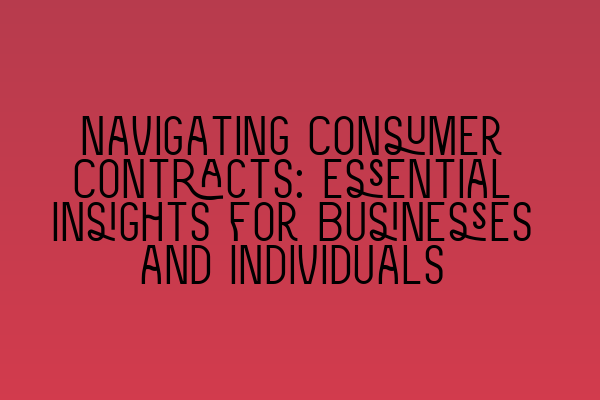Navigating Consumer Contracts: Essential Insights for Businesses and Individuals
In today’s ever-evolving commercial landscape, understanding consumer contracts is crucial for both businesses and individuals. These legally binding agreements govern the rights and obligations of parties involved in a transaction, and they can have a significant impact on both financial and legal matters.
Whether you are a business owner looking to draft a consumer contract or an individual seeking to understand your rights and protections, this comprehensive guide will provide you with essential insights to navigate consumer contracts effectively. From key terms and clauses to considerations for enforceability and dispute resolution, we’ll cover it all. So, let’s dive right in!
1. Understanding the Basics of Consumer Contracts
Consumer contracts are agreements entered into between a business (the supplier) and an individual consumer. These contracts can cover a wide range of transactions, including purchases of goods or services, rental agreements, and even online transactions. They are designed to protect the rights and interests of consumers while also providing businesses with a framework for conducting transactions in a fair and transparent manner.
2. Essential Terms and Clauses to Include
When drafting a consumer contract, businesses should ensure that certain essential terms and clauses are included. These may include:
– Identification of the parties: Clearly stating the names and contact information of both the business and the individual consumer.
– Description of goods or services: Providing a detailed description of the goods or services being offered, including any specific features or requirements.
– Price and payment terms: Outlining the agreed-upon price and any applicable payment terms, such as due dates or installment plans.
– Delivery terms: Specifying how and when the goods or services will be delivered to the consumer.
– Limitations of liability: Clearly stating any limitations on the business’s liability for damages or losses incurred by the consumer.
– Termination and cancellation provisions: Outlining the conditions under which either party may terminate the contract or cancel an order.
These are just a few examples of the essential terms and clauses that should be included in a consumer contract. However, it’s important to note that the specific requirements may vary depending on the nature of the transaction and the applicable laws in your jurisdiction.
3. Considerations for Enforceability
To ensure the enforceability of a consumer contract, businesses must adhere to certain legal requirements. These may include:
– Providing clear and understandable language: Consumer contracts should be written in plain and simple language, avoiding confusing or ambiguous terms.
– Clearly displaying terms and conditions: The terms and conditions of the contract should be easily accessible and prominently displayed, either physically or online.
– Full disclosure of important information: Businesses should provide consumers with all relevant and material information regarding the goods or services being offered, including any potential risks or limitations.
– Compliance with consumer protection laws: Consumer contracts must comply with relevant consumer protection legislation, which may impose additional requirements and restrictions on businesses.
By ensuring that your consumer contract meets these requirements, you can enhance its enforceability and minimize the risk of legal disputes.
4. Dispute Resolution Mechanisms
Even with a well-drafted consumer contract, disputes may still arise. To effectively address these disputes and avoid costly litigation, businesses and consumers can consider alternative dispute resolution mechanisms, such as mediation or arbitration.
Mediation involves the appointment of a neutral mediator who assists parties in reaching a mutually acceptable resolution. Arbitration, on the other hand, involves the submission of the dispute to an independent arbitrator or panel, whose decision is binding on the parties.
Both mediation and arbitration are often faster and less expensive than traditional court proceedings, making them attractive options for resolving consumer contract disputes. However, it’s important to carefully consider the potential advantages and disadvantages of each mechanism before deciding on the most suitable approach.
Conclusion
In the world of consumer contracts, knowledge is power. Understanding the basics, including essential terms and clauses, enforceability requirements, and dispute resolution mechanisms, can empower both businesses and individuals to navigate these agreements with confidence and clarity.
Remember, when drafting or entering into a consumer contract, it is always advisable to seek professional legal advice to ensure compliance with applicable laws and to protect your rights and interests.
For more information on related topics, be sure to check out these articles:
– SQE 1 Practice Exam Questions
– SQE 1 Practice Mocks FLK1 FLK2
– SQE 2 Preparation Courses
– SQE 1 Preparation Courses
– SRA SQE Exam Dates
Remember to always seek professional legal advice for your specific circumstances.
